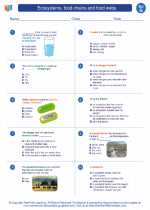Carrier
In biology, a carrier refers to an individual who possesses a particular genetic trait or mutation, but does not display any symptoms of the associated condition. This concept is commonly associated with genetic disorders that are inherited in an autosomal recessive manner.
Genetics of Carriers
Carriers typically inherit one copy of a mutated gene from one of their parents. In the case of autosomal recessive disorders, an individual must inherit two copies of the mutated gene (one from each parent) in order to display symptoms of the disorder. Carriers, on the other hand, only have one copy of the mutated gene and therefore do not exhibit symptoms.
Identifying Carriers
Identifying carriers of genetic disorders is important for several reasons, including family planning and genetic counseling. Carriers can be identified through genetic testing, which can reveal the presence of a mutated gene even in the absence of symptoms. Additionally, carriers may have a family history of the genetic disorder, which can also raise suspicion of carrier status.
Study Guide
- What is a carrier in the context of biology?
- How are carriers related to autosomal recessive disorders?
- How can carriers of genetic disorders be identified?
- Why is it important to identify carriers of genetic disorders?
◂Science Worksheets and Study Guides Seventh Grade. Ecosystems, food chains and food webs

 Activity Lesson
Activity Lesson
 Worksheet/Answer key
Worksheet/Answer key
 Worksheet/Answer key
Worksheet/Answer key
 Worksheet/Answer key
Worksheet/Answer key
 Vocabulary/Answer key
Vocabulary/Answer key
 Vocabulary/Answer key
Vocabulary/Answer key
 Vocabulary/Answer key
Vocabulary/Answer key
 Vocabulary/Answer key
Vocabulary/Answer key
 Vocabulary/Answer key
Vocabulary/Answer key
